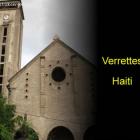ADVERTISEMENT
French - Haiti Observer Blog
French, Haiti Observer Blog. Read the following articles about French
The French Revolution in Saint-Domingue (Haiti) from 1788 to 1790
The French Revolution begins in June 1788 with the Third Estate assembling in the tennis court at Versailles to draft a new constitution and declare itself as "the nation, the true representative of the people," being sworn as "a body, never to disperse." In fall 1788, Saint Domingue's Provincial Assembly receives a petition requesting "political rights for free persons of color." a similar petition is submitted in November by a white colonist.
In 1789, Martinique slaves revolt partly because of the influence of the French Revolution. The instability of Saint Domingue also increases. On 17th June 1789, the Third Estate declares itself the National Assembly in France. On 14th July 1789, the fall of the Bastille triggers commencement of the French Revolution. The social and political structures of France descent into chaos as violence break out. On 26th August 1789, the National Assembly adopts the declaration of the Rights of Man and Citizens.
Haiti's Low Cultural Diversity Owing to Mulato Elite
In a study conducted by Erkan Gören, a scientist at Germany's Oldenburg University, he has determined how culturally diverse countries are, according to databanks compiled of each country's ethnic and racial demographics. Among 180 countries surveyed, Haiti showed little cultural diversity when assigned a computer-generated rating.
To clarify, the concept of cultural diversity is separate from racial diversity. Cultural diversity is based on racial and ethnic diversities. The more types of racial and ethnic populations, the more languages and cultural values they share.
Haiti's racial lineage began with the indigenous Taino Indians, who were bred out of existence by slaves emigrating from the Republic of Congo. At the same time, the Spanish and French invasions changed Haiti's racial and cultural profile further. The French and the Spanish battled for control of Hispaniola. Eventually the French retained control of the western half of the island, and the Spanish the larger eastern segment, named the Dominican Republican. The French interbred with African slaves, producing the light-skinned mulatto elite, who were high-born and spoke French. The low-born and darker-skinned Haitians were of Spanish and African blood.
Language Discrimination in Haiti: French Vs Haitian Creole
French and Creole are the two official languages of Haiti and still, French is given more importance than Creole. This discrimination, as seen by many intellectuals worldwide, is primarily because of the fact that Creole is a mix of several West African languages and French. Creole, which is today the lingua franca, actually started when African slaves arrived at Saint Domingue and tried to speak French by whatever they picked up through listening. The reason why they tried to speak French was that the African slaves from different parts of West Africa had different languages and they failed to communicate with each other. Hence, they picked up French.
Haiti Language Crisis - Do they speak French or Creole
Language is an important aspect in any nation. It is what unites a country and bridges it with the international community. More importantly, language is what makes every citizen understand each other.
That seems not to be the case in Haiti.
Having a language barrier can be a challenge to any country. Haiti faces language difficulties as there are two main languages that are widely used: the Creole and the French. People and linguists have different opinions on both these languages and how they affect Haiti society.
The Argument for Professional Haitian Creole Translators
Like any other languages, Haitian Creole is not something that you can teach or translate easily. It would take a professional to translate such language efficiently. Just because it is derived from the French language does not necessarily mean that a French person can successfully translate it. Keep in mind that Haitian Creole and French have a lot of differences. Though Haitian Creole draws a huge influence from the French language, it also has touches of Native American, West African, Spanish, Portuguese and Arabic languages. With this, the only one who can accurately translate it is a professional Haitian Creole translator.
CARICOM Chairmanship Puts Haiti in the Driver's Seat
Haiti has achieved a first in the history of the Caribbean Community's Conference of Heads of Government (CARICOM), appointed to the Chairmanship of the regional body. Haiti President Martelly took the reins of leadership on January 1, 2013. The event was supposed to happen in 2010, before Haiti's earthquake smashed the island to smithereens. Then-President Rene Preval ceded the chairmanship to Jamaica.
Throughout his presidency, Martelly has raised concerns about Haiti's integration within CARICOM's governing body. He wants French to become a certified language, claiming over half of CARICOM's members speak French or Créole. He also intends to make certain Haiti, as a member-nation of CARICOM, reaps the fruits of its membership.
Haiti's CARIFESTA Bid to Achieve Parity with CARICOM
The Government of Haiti (GOH), in an ongoing effort to increase tourism, is submitting a competitive bid to play host for the CARIFESTA annual arts and music fair in 2015, announced President Martelly's office.
This announcement comes on the heels of President Martelly's attendance at the CARICOM Summit in St. Lucia, and signing of a Memorandum of Intention, agreed to by the GOH and CARICOM. Contained in the memorandum are commitments between the partners for the re-development of Haiti, the renewal of agriculture production, and the simplification of procuring private investments.
At the Summit working sessions, President Martelly laid out his government's objectives and the projected outcomes of the GOH's intention to present Haiti in a more positive light on the global stage, conditioned by an improved quality of life standard and sustained economic growth.
Limonade, A Remote Location In Haiti
Limonade is located in Haiti's Nord Department. In the Cap-Haitien Arrondissment, it is a municipality. Around 69,256 people inhabit the place. Limonade is remotely placed on Haiti's northern coast. Roucou, Basse Plaine and Bois de Lance are the three districts and settlements in the neighboring areas of Limonade.
Why Limonade Is In The News
It was in Limonade that the first Christmas was celebrated in 1492 by Christopher Columbus and his crew. At Bord de Mer the great explorer he had docked his ship in the land he conquered near Limonade. In 1714, Charles Fournier de la Chapelle a well known French judge was born in Limonade.
Our objective is to share with you news and information about Haiti and the people of Haiti. Traditions, habits and the way we were or grew are alive in this site. We highly recommend that you Subscribe to our Newsletter and also share with us some of the things that are memorable and made us unique people.


 Haiti tech Summit
Haiti tech Summit  Verrettes, Haiti
Verrettes, Haiti  Thomonde, Haiti
Thomonde, Haiti  Saint Michel de L 'Atalaye
Saint Michel de L 'Atalaye  Life After Death
Life After Death